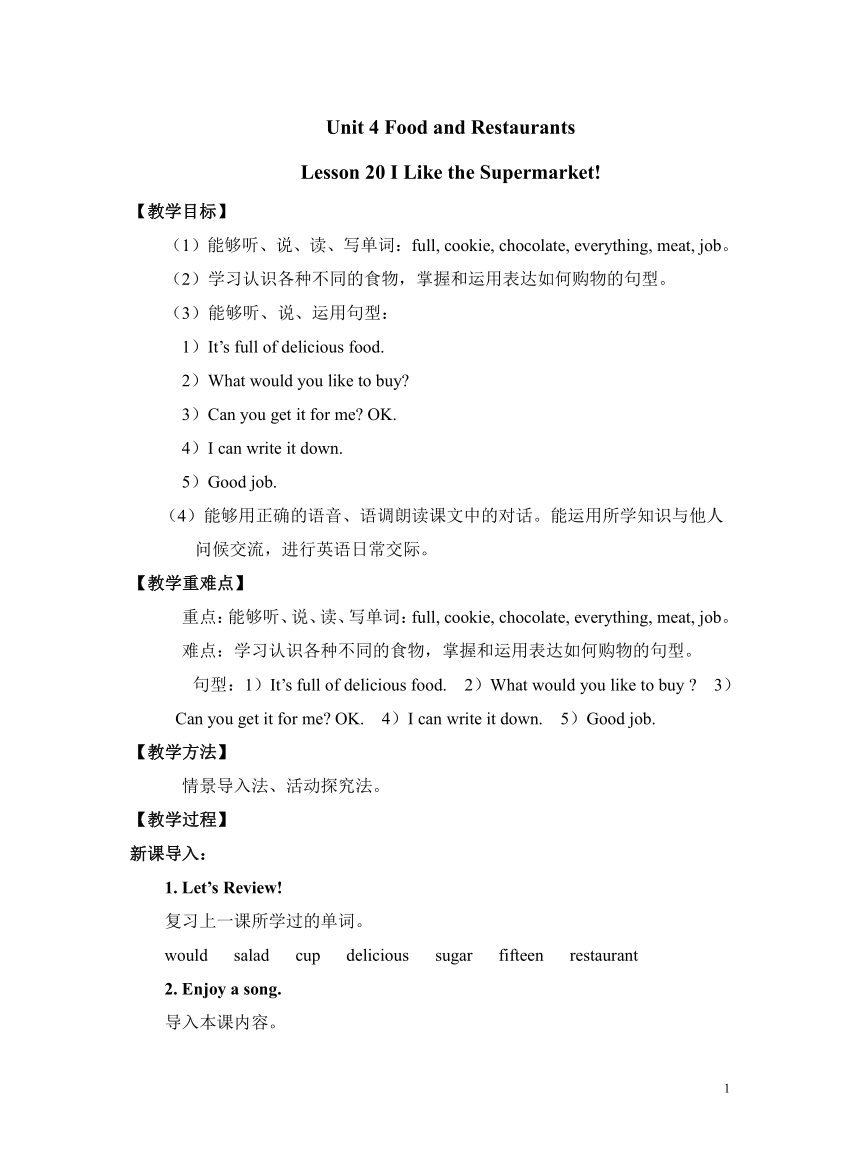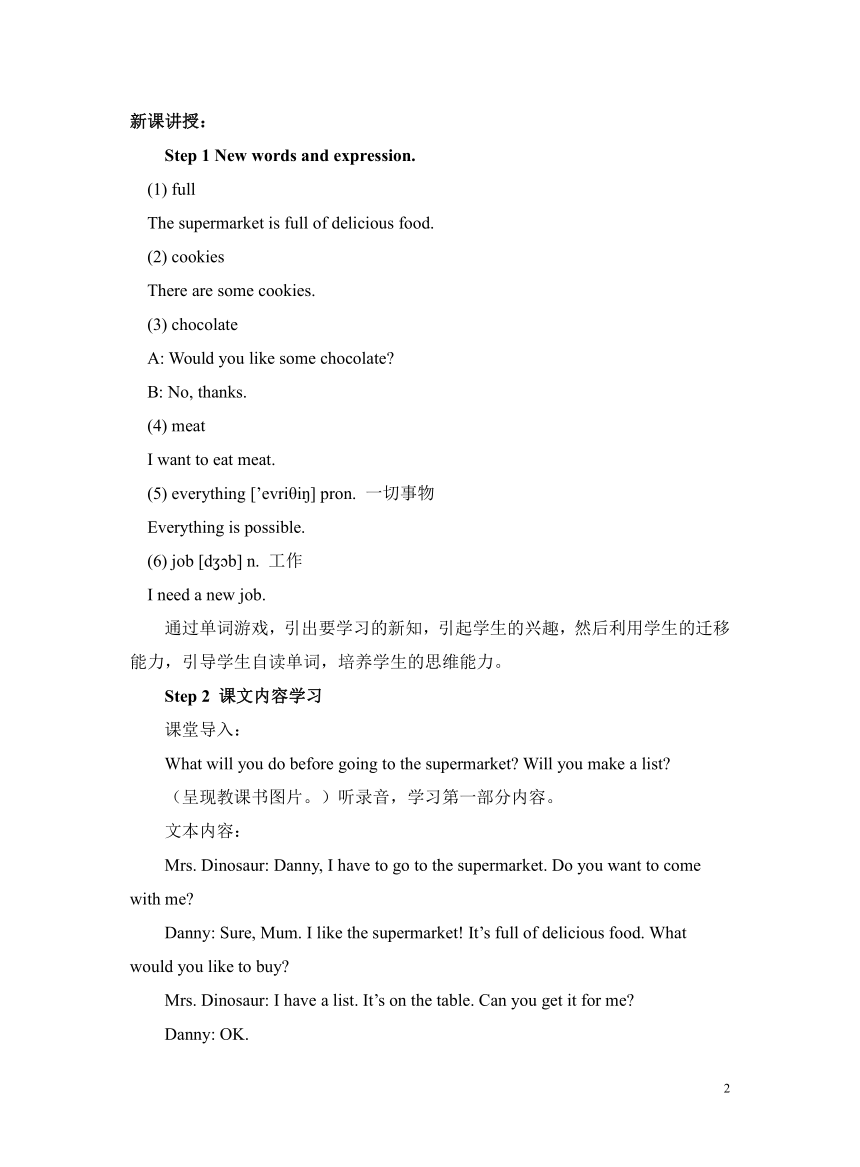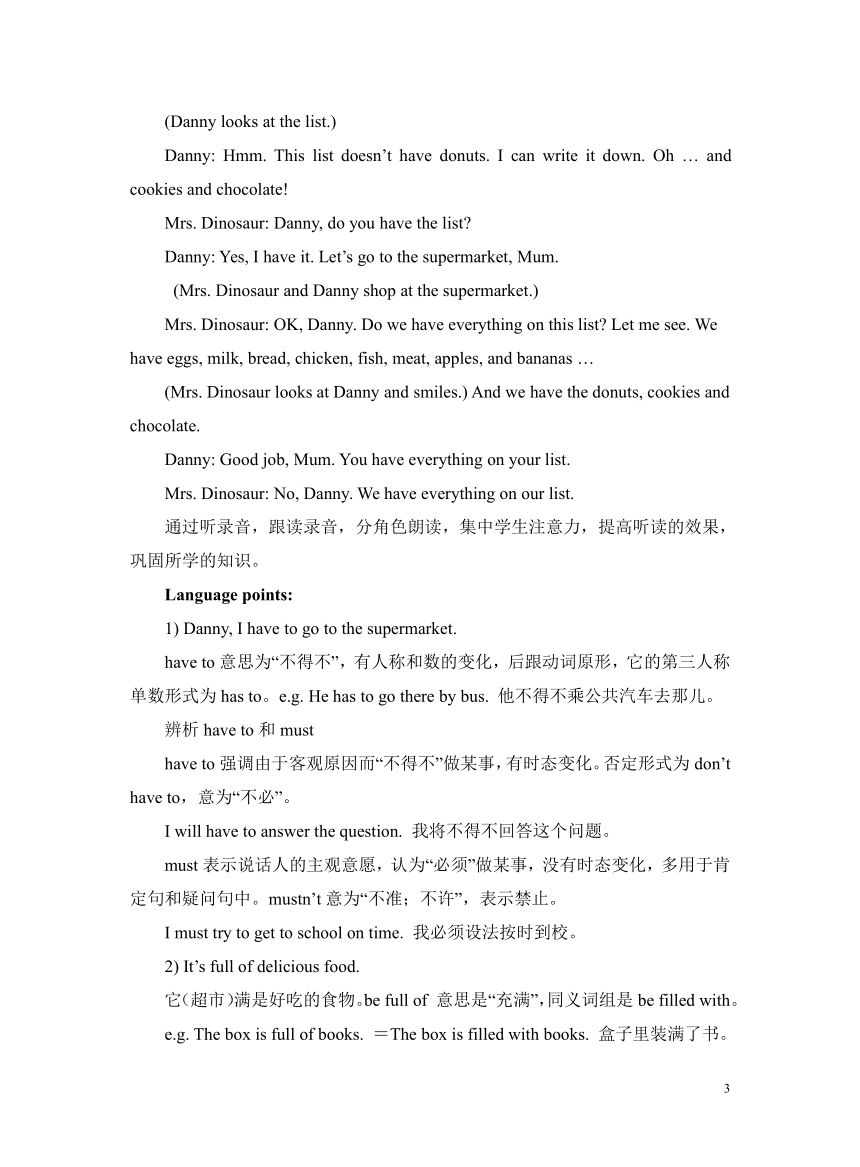冀教版英语七年级上册 Unit 4 Food and Restaurants Lesson 20 I Like the Supermarket! 教案
文档属性
| 名称 | 冀教版英语七年级上册 Unit 4 Food and Restaurants Lesson 20 I Like the Supermarket! 教案 |  | |
| 格式 | docx | ||
| 文件大小 | 19.7KB | ||
| 资源类型 | 教案 | ||
| 版本资源 | 冀教版 | ||
| 科目 | 英语 | ||
| 更新时间 | 2023-09-06 23:08:33 | ||
图片预览



文档简介
Unit 4 Food and Restaurants
Lesson 20 I Like the Supermarket!
【教学目标】
(1)能够听、说、读、写单词:full, cookie, chocolate, everything, meat, job。
(2)学习认识各种不同的食物,掌握和运用表达如何购物的句型。
(3)能够听、说、运用句型:
1)It’s full of delicious food.
2)What would you like to buy
3)Can you get it for me OK.
4)I can write it down.
5)Good job.
(4)能够用正确的语音、语调朗读课文中的对话。能运用所学知识与他人问候交流,进行英语日常交际。
【教学重难点】
重点:能够听、说、读、写单词:full, cookie, chocolate, everything, meat, job。
难点:学习认识各种不同的食物,掌握和运用表达如何购物的句型。
句型:1)It’s full of delicious food. 2)What would you like to buy 3)Can you get it for me OK. 4)I can write it down. 5)Good job.
【教学方法】
情景导入法、活动探究法。
【教学过程】
新课导入:
1. Let’s Review!
复习上一课所学过的单词。
would salad cup delicious sugar fifteen restaurant
2. Enjoy a song.
导入本课内容。
新课讲授:
Step 1 New words and expression.
(1) full
The supermarket is full of delicious food.
(2) cookies
There are some cookies.
(3) chocolate
A: Would you like some chocolate
B: No, thanks.
(4) meat
I want to eat meat.
(5) everything [’evriθi ] pron. 一切事物
Everything is possible.
(6) job [d b] n. 工作
I need a new job.
通过单词游戏,引出要学习的新知,引起学生的兴趣,然后利用学生的迁移能力,引导学生自读单词,培养学生的思维能力。
Step 2 课文内容学习
课堂导入:
What will you do before going to the supermarket Will you make a list
(呈现教课书图片。)听录音,学习第一部分内容。
文本内容:
Mrs. Dinosaur: Danny, I have to go to the supermarket. Do you want to come with me
Danny: Sure, Mum. I like the supermarket! It’s full of delicious food. What would you like to buy
Mrs. Dinosaur: I have a list. It’s on the table. Can you get it for me
Danny: OK.
(Danny looks at the list.)
Danny: Hmm. This list doesn’t have donuts. I can write it down. Oh … and cookies and chocolate!
Mrs. Dinosaur: Danny, do you have the list
Danny: Yes, I have it. Let’s go to the supermarket, Mum.
(Mrs. Dinosaur and Danny shop at the supermarket.)
Mrs. Dinosaur: OK, Danny. Do we have everything on this list Let me see. We have eggs, milk, bread, chicken, fish, meat, apples, and bananas …
(Mrs. Dinosaur looks at Danny and smiles.) And we have the donuts, cookies and chocolate.
Danny: Good job, Mum. You have everything on your list.
Mrs. Dinosaur: No, Danny. We have everything on our list.
通过听录音,跟读录音,分角色朗读,集中学生注意力,提高听读的效果,巩固所学的知识。
Language points:
1) Danny, I have to go to the supermarket.
have to意思为“不得不”,有人称和数的变化,后跟动词原形,它的第三人称单数形式为has to。e.g. He has to go there by bus. 他不得不乘公共汽车去那儿。
辨析have to和must
have to强调由于客观原因而“不得不”做某事,有时态变化。否定形式为don’t have to,意为“不必”。
I will have to answer the question. 我将不得不回答这个问题。
must表示说话人的主观意愿,认为“必须”做某事,没有时态变化,多用于肯定句和疑问句中。mustn’t意为“不准;不许”,表示禁止。
I must try to get to school on time. 我必须设法按时到校。
2) It’s full of delicious food.
它(超市)满是好吃的食物。be full of 意思是“充满”,同义词组是be filled with。
e.g. The box is full of books. =The box is filled with books. 盒子里装满了书。
This cup is full of water. 这个杯子里充满了水。
The future is full of hope. 未来充满希望。
3) You have everything on your list.
你已经买到了购物单上的所有。
everything / evr θ / pron.一切事物
everything作主语,谓语动词用单数。
e.g. Everything is ready now. 现在一切都准备好了。
4) What would you like to buy 你想买些什么呢?
句中的would like结构常用于礼貌地提出要求或表示愿意提供帮助,注意like后面可接名词、代词和动词不定式等。
would like表示“想要”, 较want更婉转, 但有些时候二者可互换。would like在口语中常说成“ ’d like”, 可用于所有人称。
I’d like (to drink) some water.
=I would like (to drink) some water.
=I want (to drink) some water.
Task: Listen to Part 1. Fill in the blanks.
Step 3 Let’s Do It!
1. Read the lesson and write true (T) or false (F).
2. Look at the pictures and fill in the blanks.
3. Rewrite the sentences into questions.
4. Fill in the blanks with the words in the box.
5. Work in pairs. What would you like to buy at the supermarket Make a shopping list, then make up a dialogue.
Role play
1. Role play the conversation in groups;
2. Role play the conversation in front of the class.
课堂练习:
一、句型转换。
1. I’d like some fish. (变成一般疑问句, 并作否定回答)
________ you ______ ______ fish
No, ________.
2. Li Ling comes for supper. (变成一般疑问句)
______ Li Ling ______ for supper
3. I like some dumplings. (变成否定句)
I ______ like ______ dumplings.
4. I would like some water. (变同义句)
I ______ some water.
二、单项选择。
1. —Would you like ___ lunch with me
—Sorry, I have no time.
A. have B. having
C. to have D. has
2. —What would you like
—I’d like some _____ and ______.
A. apple, pear B. dumpling, water
C. soups, meat D. fish, rice
三、写出下列句子的否定句、一般疑问句及其答语。每空词数不限。
1. Mary has some juice.
否定句:______________________________
一般疑问句:
—___________________________________
— Yes, _________. / No, ___________.
2. Jack is a policeman (警察).
否定句:______________________________
一般疑问句:
___________________________________
— Yes, _________. / No, _________.
3. They like white shoes.
否定句:______________________________
一般疑问句:
___________________________________
— Yes, _________. / No, _________.
课堂小结:
T: What did you learn about this lesson
学生自由说,教师总结。
语言知识:
1) 识记以下单词: full, cookie, chocolate, everything, meat, job
2) 掌握短语及句型: (1)It’s full of delicious food.
(2)What would you like to buy
(3)Can you get it for me OK.
(4)I can write it down.
(5)Good job.
语言技能:
1)能运用所学知识与他人问候交流。
2)听懂并能进行英语日常交际。。
将本节课所学的知识进行归纳,帮助学生理解和记忆,巩固提升本课时所学的知识。
作业布置:
完成配套课后练习。
【板书设计】
Unit 4 Food and Restaurants
Lesson 20 I Like the Supermarket!
full, cookie, chocolate, everything, meat, job
(1)It’s full of delicious food.
(2)What would you like to buy
(3)Can you get it for me OK.
(4)I can write it down.
(5)Good job.
【课后反思】
本课时的教学内容是冀教版七年级上册英语第四单元的第二课时, 重点在于引导学生理解语境, 从表示购物的词开始, 自然地导入谈论去超市购物的话题。以购物清单作为任务引起学生的听说兴趣, 训练学生的听力和口语表达能力。利用动作、手势和图片学习英语单词, 同时在对话中反复运用新学的单词和短语。因此, 教师可以将知识目标定为掌握本课时新出现的词和短语, 介绍如何购物的句型。
1
Lesson 20 I Like the Supermarket!
【教学目标】
(1)能够听、说、读、写单词:full, cookie, chocolate, everything, meat, job。
(2)学习认识各种不同的食物,掌握和运用表达如何购物的句型。
(3)能够听、说、运用句型:
1)It’s full of delicious food.
2)What would you like to buy
3)Can you get it for me OK.
4)I can write it down.
5)Good job.
(4)能够用正确的语音、语调朗读课文中的对话。能运用所学知识与他人问候交流,进行英语日常交际。
【教学重难点】
重点:能够听、说、读、写单词:full, cookie, chocolate, everything, meat, job。
难点:学习认识各种不同的食物,掌握和运用表达如何购物的句型。
句型:1)It’s full of delicious food. 2)What would you like to buy 3)Can you get it for me OK. 4)I can write it down. 5)Good job.
【教学方法】
情景导入法、活动探究法。
【教学过程】
新课导入:
1. Let’s Review!
复习上一课所学过的单词。
would salad cup delicious sugar fifteen restaurant
2. Enjoy a song.
导入本课内容。
新课讲授:
Step 1 New words and expression.
(1) full
The supermarket is full of delicious food.
(2) cookies
There are some cookies.
(3) chocolate
A: Would you like some chocolate
B: No, thanks.
(4) meat
I want to eat meat.
(5) everything [’evriθi ] pron. 一切事物
Everything is possible.
(6) job [d b] n. 工作
I need a new job.
通过单词游戏,引出要学习的新知,引起学生的兴趣,然后利用学生的迁移能力,引导学生自读单词,培养学生的思维能力。
Step 2 课文内容学习
课堂导入:
What will you do before going to the supermarket Will you make a list
(呈现教课书图片。)听录音,学习第一部分内容。
文本内容:
Mrs. Dinosaur: Danny, I have to go to the supermarket. Do you want to come with me
Danny: Sure, Mum. I like the supermarket! It’s full of delicious food. What would you like to buy
Mrs. Dinosaur: I have a list. It’s on the table. Can you get it for me
Danny: OK.
(Danny looks at the list.)
Danny: Hmm. This list doesn’t have donuts. I can write it down. Oh … and cookies and chocolate!
Mrs. Dinosaur: Danny, do you have the list
Danny: Yes, I have it. Let’s go to the supermarket, Mum.
(Mrs. Dinosaur and Danny shop at the supermarket.)
Mrs. Dinosaur: OK, Danny. Do we have everything on this list Let me see. We have eggs, milk, bread, chicken, fish, meat, apples, and bananas …
(Mrs. Dinosaur looks at Danny and smiles.) And we have the donuts, cookies and chocolate.
Danny: Good job, Mum. You have everything on your list.
Mrs. Dinosaur: No, Danny. We have everything on our list.
通过听录音,跟读录音,分角色朗读,集中学生注意力,提高听读的效果,巩固所学的知识。
Language points:
1) Danny, I have to go to the supermarket.
have to意思为“不得不”,有人称和数的变化,后跟动词原形,它的第三人称单数形式为has to。e.g. He has to go there by bus. 他不得不乘公共汽车去那儿。
辨析have to和must
have to强调由于客观原因而“不得不”做某事,有时态变化。否定形式为don’t have to,意为“不必”。
I will have to answer the question. 我将不得不回答这个问题。
must表示说话人的主观意愿,认为“必须”做某事,没有时态变化,多用于肯定句和疑问句中。mustn’t意为“不准;不许”,表示禁止。
I must try to get to school on time. 我必须设法按时到校。
2) It’s full of delicious food.
它(超市)满是好吃的食物。be full of 意思是“充满”,同义词组是be filled with。
e.g. The box is full of books. =The box is filled with books. 盒子里装满了书。
This cup is full of water. 这个杯子里充满了水。
The future is full of hope. 未来充满希望。
3) You have everything on your list.
你已经买到了购物单上的所有。
everything / evr θ / pron.一切事物
everything作主语,谓语动词用单数。
e.g. Everything is ready now. 现在一切都准备好了。
4) What would you like to buy 你想买些什么呢?
句中的would like结构常用于礼貌地提出要求或表示愿意提供帮助,注意like后面可接名词、代词和动词不定式等。
would like表示“想要”, 较want更婉转, 但有些时候二者可互换。would like在口语中常说成“ ’d like”, 可用于所有人称。
I’d like (to drink) some water.
=I would like (to drink) some water.
=I want (to drink) some water.
Task: Listen to Part 1. Fill in the blanks.
Step 3 Let’s Do It!
1. Read the lesson and write true (T) or false (F).
2. Look at the pictures and fill in the blanks.
3. Rewrite the sentences into questions.
4. Fill in the blanks with the words in the box.
5. Work in pairs. What would you like to buy at the supermarket Make a shopping list, then make up a dialogue.
Role play
1. Role play the conversation in groups;
2. Role play the conversation in front of the class.
课堂练习:
一、句型转换。
1. I’d like some fish. (变成一般疑问句, 并作否定回答)
________ you ______ ______ fish
No, ________.
2. Li Ling comes for supper. (变成一般疑问句)
______ Li Ling ______ for supper
3. I like some dumplings. (变成否定句)
I ______ like ______ dumplings.
4. I would like some water. (变同义句)
I ______ some water.
二、单项选择。
1. —Would you like ___ lunch with me
—Sorry, I have no time.
A. have B. having
C. to have D. has
2. —What would you like
—I’d like some _____ and ______.
A. apple, pear B. dumpling, water
C. soups, meat D. fish, rice
三、写出下列句子的否定句、一般疑问句及其答语。每空词数不限。
1. Mary has some juice.
否定句:______________________________
一般疑问句:
—___________________________________
— Yes, _________. / No, ___________.
2. Jack is a policeman (警察).
否定句:______________________________
一般疑问句:
___________________________________
— Yes, _________. / No, _________.
3. They like white shoes.
否定句:______________________________
一般疑问句:
___________________________________
— Yes, _________. / No, _________.
课堂小结:
T: What did you learn about this lesson
学生自由说,教师总结。
语言知识:
1) 识记以下单词: full, cookie, chocolate, everything, meat, job
2) 掌握短语及句型: (1)It’s full of delicious food.
(2)What would you like to buy
(3)Can you get it for me OK.
(4)I can write it down.
(5)Good job.
语言技能:
1)能运用所学知识与他人问候交流。
2)听懂并能进行英语日常交际。。
将本节课所学的知识进行归纳,帮助学生理解和记忆,巩固提升本课时所学的知识。
作业布置:
完成配套课后练习。
【板书设计】
Unit 4 Food and Restaurants
Lesson 20 I Like the Supermarket!
full, cookie, chocolate, everything, meat, job
(1)It’s full of delicious food.
(2)What would you like to buy
(3)Can you get it for me OK.
(4)I can write it down.
(5)Good job.
【课后反思】
本课时的教学内容是冀教版七年级上册英语第四单元的第二课时, 重点在于引导学生理解语境, 从表示购物的词开始, 自然地导入谈论去超市购物的话题。以购物清单作为任务引起学生的听说兴趣, 训练学生的听力和口语表达能力。利用动作、手势和图片学习英语单词, 同时在对话中反复运用新学的单词和短语。因此, 教师可以将知识目标定为掌握本课时新出现的词和短语, 介绍如何购物的句型。
1
同课章节目录
- Unit 1 School and friends
- Lesson 1 Hello!
- Lesson 2 Teacher and Students
- Lesson 3 Welcome to Our School
- Lesson 4 What Is It?
- Lesson 5 May I Have a Book?
- Lesson 6 Things for School
- Unit 2 Colours and Clothes
- Lesson 7 Jenny's New Skirt
- Lesson 8 Danny's Favourit Colou
- Lesson 9 Whose Coat Is This?
- Lesson 10 Clothes for a Cold Day
- Lesson 11 Clothes around the World
- Lesson 12 Let's Go Shopping!
- Unit 3 Body Parts and Feelings
- Lesson 13 Body Parts
- Lesson 14 Colours and Feelings
- Lesson 15 Tall or Short
- Lesson 16 Happy or Sad
- Lesson 17 Seeing a Docto
- Lesson 18 We All Look Different!
- Unit 4 Food and Restaurants
- Lesson 19 Time for Breakfast!
- Lesson 20 I Like the Supermarket!
- Lesson 21 At the Market
- Lesson 22 In the Restaurant
- Lesson 23 The Corner Store
- Lesson 24 Eat Good Food!
- Unit 5 Family and Home
- Lesson 25 Jenny's Family
- Lesson 26 Li Ming's Family
- Lesson 27 Danny at Home
- Lesson 28 A Family Picnic
- Lesson 29 A Birthday Card
- Lesson 30 Grandma's Birthday Party
- Unit 6 Let's Go!
- Lesson 31 Let's Go to the Bookstore!
- Lesson 32 At the Supermarket
- Lesson 33 Let's Go to the Zoo!
- Lesson 34 On the Farm
- Lesson 35 Let's Go to the Museum!
- Lesson 36 Let's Go to the Movie Theatre!
- Unit 7 Days and Months
- Lesson 37 Seasons and Weathe
- Lesson 38 Nick's Busy Month
- Lesson 39 A Class Calenda
- Lesson 40 When Is Your Birthday?
- Lesson 41 Holidays
- Lesson 42 Happy Holidays!
- Unit 8 Countries around the world
- Lesson 43 Directions
- Lesson 44 Jack's Goodbye Party
- Lesson 45 China
- Lesson 46 Canada and the U.S.
- Lesson 47 The U.K. and Australia
- Lesson 48 English-Speaking Countries
